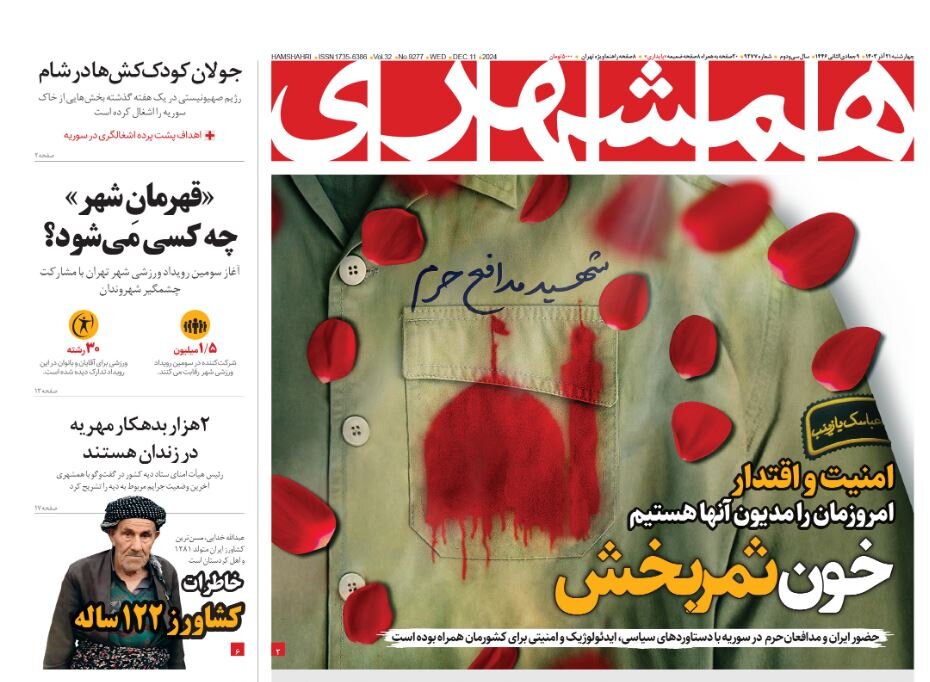Syria and the new Middle East
Syria and the new Middle East
TEHRAN - In an interview with Nasser Imani, a political expert, Hamshahri discussed the developments of the Syrian war.

Imani said: Bashar Assad's government fell 13 years after the wave of protests and riots and the defeat of ISIS in the country. What Iran did in all these years to support Syria, contrary to some who only give it an ideological face, was taking care of the country's national interests. The West and the Zionist regime planned to overthrow Assad so that Syria would be fragmented and would no longer have a military force. This is the West's plan for the new Middle East. At one point, Iran fought ISIS, which as the Westerners themselves acknowledged, was created with their support. The main goal of creating ISIS was to counter Iran, but Iran did not let the mission of the West and ISIS fetch up. Iran preserved its national interests, not guarding the rule of other countries. Although the resistance movement was weakened by the events in Syria, this will not continue and the developments will not stay like this. In the near future, the effects of Iran's support for the resistance front in previous years will be seen.
Farhihtegan: Why the 2024 developments not similar to the 2011’s?
In a note, Farhikhtgan discussed the overthrow of the Syrian political system and the dissimilarity of the current situation in Syria with the conditions of the country in 2011. It said: The relationship of the Islamic Republic with the Syrian political system was “special” during the Syrian war. Iran supported the political system in Syria. Of course, the basis of Iran's relationship with the Syrian political system was to counter the Zionist regime. But there are various reasons why 2024 was not like 2011. First of all, even if the Axis Resistance, including Iran, had a decision they did not have the opportunity to implement it because of the rapid pace of the developments. Of course, this time the developments in Syria were different for Iran. The militant groups did not raise slogans of cross-border or territorial greed against Iranian soil. Second, these groups did not take hostile moves against the Shiites. In addition to Iran, Iraqi and Lebanese Shiite groups did not find a reason to deal with them. The attack by the armed groups in 2024 on the Syrian government was similar to the riot of the Free Army against it, in which Iran and the Axis of Resistance supported their ally only in the form of advisor.
Donya-e-Eqtesad: The troika opportunism following the Assad fall
In an interview with Tahmoures Gholami, a researcher on international issues, Donya-e-Eqtesad discussed Iran's future negotiations with Europe and the West in the current situation. He said: In recent days, the International Atomic Energy Agency once again has intensified its pressure on Iran under the influence of the European troika (Britain, France and Germany). In a new statement, the troika expressed concern about the increase in Iran’s enrichment capacity. In part of their statement the trio said, “We are also extremely concerned to learn that Iran has increased the number of centrifuges in use and started preparations to install additional enrichment infrastructure, further increasing Iran’s enrichment capacity.” Concerns have been put on the agenda after the developments in Syria to put more pressure on Iran. According to many experts and observers, this issue will not be resolved without direct or indirect negotiations through the creation of a channel with the Trump administration. The recent talks in Geneva were useless inconclusive. The fall of the Assad government in Damascus has had an undesirable effect on Iran's situation and its effect should not be denied. But we should not exaggerate about its effectiveness.
Iran: The West worried about balance of power in Iran’s favor
As the competition increases in Syria without Assad, the regional actors who see themselves as the victors of the Syrian battle are worried about the strengthening of Tehran's role. Therefore, regional rivals are more concerned about the realities that can emerge in the ambiguous situation in Syria. From this point of view, it is natural that different armed groups who have toppled the Assad government to prevent the formation of such a balance in favor of Tehran, and ultimately to make the situation complicated with the support of countries outside the region.
source: tehrantimes.com